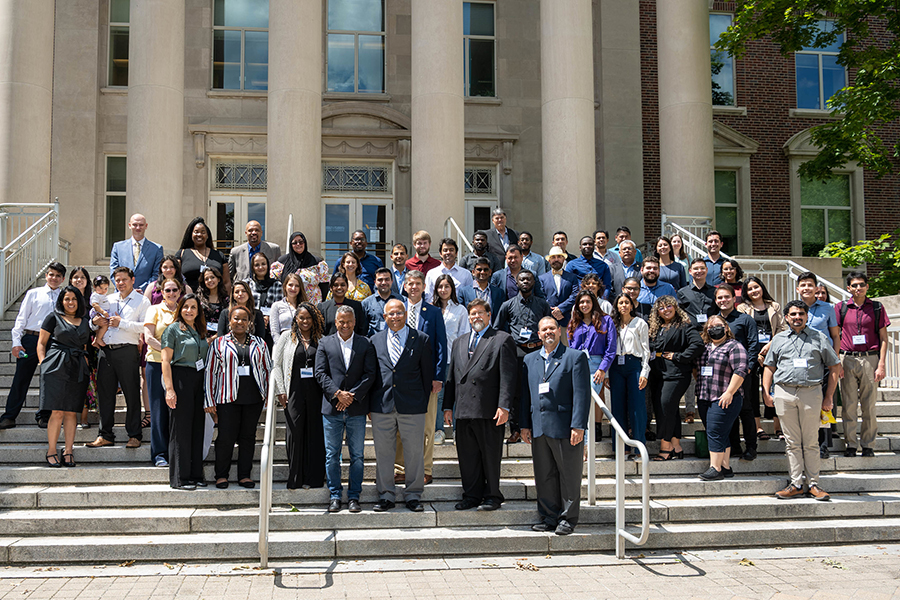Using engineering to help refugee women

Refugee women face many challenges while adjusting to their new country, including navigating cultural differences, language barriers, facing discrimination, trauma, and feeling like they are unable to integrate into their host society.
“As engineers we don’t try to bridge that gap — we usually leave it to the social scientists to figure out — but we play a huge role in it,” said Tanya Purwar, a PhD candidate in mechanical engineering. “This is a transdisciplinary problem. Engineers, demographers, politicians, social scientists, everybody has to come together to solve this problem.”
Purwar created the Building Entrepreneurial Capacity for Refugee Women (BECRW) program: a 6-week immersive online learning experience for 19 refugee women, recruited from El Paso, Texas and Phoenix, Arizona. The program sought to fill the research gap on targeted educational and entrepreneurial interventions for refugee women and the challenges they face by examining the intersection of gender, immigration status, and climate change.
The program came about under the guidance of Luciano Castillo, Kenninger Professor of Renewable Energy and Power Systems in Mechanical Engineering. In 2021, Castillo co-chaired a symposium at the USA-Mexico border that focused on discussing issues on energy, water, agriculture and sustainable manufacturing. Shortly after the symposium, the U.S. Navy’s Office of Naval Research (ONR) granted $2.8 million to Purdue University, Tuskegee University, the University of Puerto Rico, the U.S. Naval Academy, NASA, and other industry partners, government agencies, and universities. The grant funded the Blue Integrated Partnerships (BIP) program, which aims to recruit underrepresented minority students to participate in research projects and workshops.
“Dr. Castillo is always actively working on energy-related problems and is very much involved in diversity and inclusion,” stated Purwar. “It always inspired me how he’s trying to recruit more students from around the world.”

During the 6-week BECRW program, the refugee women participated in lectures on sustainable entrepreneurship where they were encouraged to start their own small scale businesses and were taught how to pitch their ideas. Purdue Global, an online education program tailored to the unique needs of working adults, funded and certified this course.
“There was a lot of encouragement and enablement from Purdue that allowed me to be able to do this research,” said Purwar.
The women were also encouraged to join sessions and workshops on topics ranging from aerospace to mechanical engineering. There were weekly assignments, poster shows, research presentations and participants were able to give and receive valuable feedback from their peers. The program was hybrid, allowing flexibility for the women working full-time jobs. Each woman had their own mentor who provided them with guidance and support throughout the 6 weeks. At the end of the program, participants attended a four-day conference in West Lafayette as part of the Summer Institute for Sustainability and Climate Change (SISCC), where they were able to pitch their business ideas to a room full of judges, professors, and several government organizations. They also had the opportunity to learn about the latest advancements in sustainability and network with other scholars and minority-owned companies.
Participants were asked to complete a survey before and after the 6-week program, as well as a semi-structured interview in order for researchers to collect both quantitative and qualitative data. The survey showed improvements in participants’ social and psychological well-being. The interviews revealed more significant results, showing that participants felt isolated and detached before the program but experienced personal transformation, felt empowered by the supportive environment and developed a sense of belonging within the community after the program.
“As a mechanical engineer, it was a great experience doing social science-related research and also integrating my mathematical and statistical acumen in this and looking at problems in a more objective manner,” stated Purwar. “Going forward, we want to continue to implement this program with even more participants.”
Source: Tanya Purwar, tpurwar@purdue.edu; Luciano Castillo, lcastillo@purdue.edu
Writer: Julia Davis, juliadavis@purdue.edu
